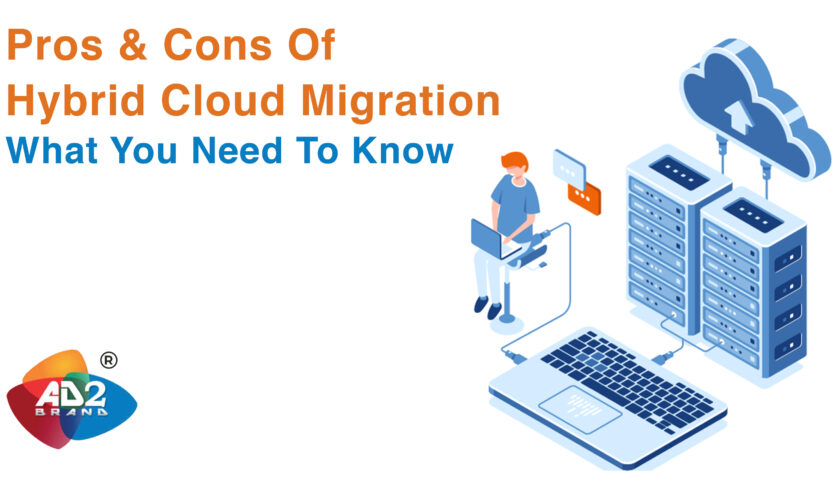In today\’s digital landscape, businesses are constantly seeking innovative solutions to optimize their IT infrastructure and improve operational efficiency. One such solution that has gained significant traction in recent years is hybrid cloud migration. This article will explore the pros and cons of hybrid cloud migration, providing you with the necessary insights to make informed decisions for your business. Whether you are a small startup or a large enterprise, understanding the benefits and drawbacks of adopting a hybrid cloud environment is crucial for long-term success.
Pros of Hybrid Cloud Migration
Flexibility and Scalability
One of the key advantages of hybrid cloud migration is the flexibility it offers to businesses. By combining public and private cloud infrastructure, organizations can leverage the benefits of both worlds. Public clouds provide unlimited scalability and resources on demand, allowing businesses to handle sudden spikes in traffic or data storage requirements efficiently. On the other hand, private clouds offer enhanced security and control over sensitive data. With hybrid cloud migration, businesses can scale their operations seamlessly while maintaining data integrity and compliance.
Cost Optimization
Cost optimization is a significant consideration for businesses of all sizes. Hybrid cloud migration provides a cost-effective solution by allowing organizations to balance their IT infrastructure expenses. Instead of investing heavily in on-premises hardware and maintenance, businesses can leverage the cost advantages of public clouds for non-sensitive operations. Critical data and applications can still be maintained on private clouds, ensuring the highest level of security. This hybrid approach allows businesses to optimize their IT budgets while meeting their specific requirements.
Disaster Recovery and Business Continuity
Ensuring the continuity of operations in the face of unforeseen events is paramount for any business. Hybrid cloud migration offers robust disaster recovery capabilities, enabling organizations to recover quickly from system failures or natural disasters. By replicating critical data and applications across multiple cloud environments, businesses can minimize downtime and ensure seamless business continuity. Public clouds often have geographically distributed data centers, providing additional redundancy and resilience to mitigate the impact of localized disruptions.
Enhanced Performance and Accessibility
Another significant benefit of hybrid cloud migration is the potential for improved performance and accessibility. By strategically distributing workloads across different cloud environments, businesses can optimize performance and minimize latency. For example, computationally intensive tasks can be offloaded to the public cloud, while latency-sensitive applications can be hosted on the private cloud. This hybrid approach ensures that businesses can deliver high-performance services to their customers, irrespective of their geographical locations.
Innovation and Agility
Embracing hybrid cloud migration opens doors to innovation and agility. By leveraging the extensive range of cloud services offered by public cloud providers, businesses can experiment with new technologies and rapidly deploy innovative solutions. The scalability and flexibility of the hybrid cloud environment allow organizations to adapt quickly to changing market dynamics and seize new business opportunities. Additionally, the ease of integrating cloud services with existing on-premises infrastructure empowers businesses to build hybrid applications that combine the best of both worlds.
Cons of Hybrid Cloud Migration
Complexity and Management Overhead
Implementing and managing a hybrid cloud environment can be complex and resource-intensive. Integrating public and private clouds, ensuring compatibility, and maintaining seamless connectivity require specialized knowledge and expertise. Organizations may need to invest in additional staff training or hire cloud experts to manage the hybrid environment effectively. Moreover, the distributed nature of the hybrid cloud can introduce complexities in monitoring and troubleshooting, requiring robust management tools and processes.
Security and Compliance Challenges
While hybrid cloud migration offers enhanced security for critical data and applications, it also introduces unique security challenges. The integration between public and private clouds can create potential vulnerabilities that malicious actors may exploit. Organizations must implement stringent security measures and employ encryption protocols to safeguard sensitive information across the hybrid cloud infrastructure. Additionally, compliance with industry regulations, such as GDPR or HIPAA, becomes more complex in a hybrid environment, as data is spread across multiple locations.
Data Transfer and Latency Issues
Transferring large volumes of data between public and private clouds can be time-consuming and bandwidth-intensive. Depending on the available network infrastructure, organizations may experience latency issues when accessing data or running applications across the hybrid cloud environment. This can impact the performance of real-time applications or data-intensive processes. To mitigate these challenges, businesses must carefully evaluate their network capabilities and consider optimizing data transfer mechanisms.
Vendor Lock-In Risks
When adopting a hybrid cloud approach, businesses often rely on multiple cloud service providers. While this offers flexibility and choice, it also carries the risk of vendor lock-in. Each cloud provider may have different service offerings, pricing models, and proprietary technologies, making it challenging to switch between providers seamlessly. Organizations must carefully assess the long-term implications and potential costs associated with vendor lock-in before committing to specific cloud providers.
Increased Complexity in Governance and Compliance
Managing governance and compliance across a hybrid cloud environment can be complex. Organizations must establish clear policies and procedures that align with regulatory requirements and internal security standards. Ensuring consistent data protection, access control, and audibility across both public and private clouds requires robust governance frameworks and monitoring mechanisms. It is essential to have a comprehensive understanding of the compliance obligations specific to each cloud environment and integrate them seamlessly.
Frequently Asked Questions (FAQs)
Q: What is hybrid cloud migration?
A: Hybrid cloud migration refers to the process of adopting a cloud computing strategy that combines public and private cloud environments. It allows organizations to leverage the benefits of both public and private clouds, offering flexibility, scalability, and enhanced security.
Q: What are the advantages of hybrid cloud migration?
A: The advantages of hybrid cloud migration include flexibility and scalability, cost optimization, disaster recovery capabilities, enhanced performance and accessibility, and the ability to drive innovation and agility.
Q: Are there any drawbacks to hybrid cloud migration?
A: Yes, there are drawbacks to hybrid cloud migration. These include the complexity and management overhead, security and compliance challenges, data transfer and latency issues, vendor lock-in risks, and increased complexity in governance and compliance.
Q: How can businesses address the complexity of managing a hybrid cloud environment?
A: To address the complexity of managing a hybrid cloud environment, businesses can invest in staff training or hire cloud experts with the necessary expertise. Implementing robust management tools and processes, and ensuring seamless connectivity and compatibility between public and private clouds can also help simplify management.
Q: What security measures should organizations take when adopting hybrid cloud migration?
A: Organizations should implement stringent security measures, including encryption protocols, to safeguard sensitive information across the hybrid cloud infrastructure. They should also carefully assess the security offerings and certifications of cloud service providers and establish clear security policies and procedures.
Q: Can businesses avoid vendor lock-in risks in a hybrid cloud environment?
A: While it can be challenging to completely avoid vendor lock-in risks in a hybrid cloud environment, businesses can mitigate the impact by carefully evaluating cloud providers and their service offerings upfront. They should consider interoperability and compatibility between providers to minimize potential switching costs.
Conclusion
Hybrid cloud migration offers numerous benefits for businesses, including flexibility and scalability, cost optimization, disaster recovery capabilities, enhanced performance and accessibility, and the ability to drive innovation and agility. However, there are also several drawbacks that organizations should consider, such as complexity and management overhead, security and compliance challenges, data transfer and latency issues, vendor lock-in risks, and increased complexity in governance and compliance.
To overcome these challenges, businesses can invest in staff training or hire cloud experts to manage the hybrid cloud environment effectively. Implementing robust security measures, including encryption protocols, is crucial for safeguarding sensitive information. Additionally, organizations should carefully evaluate cloud providers and their service offerings to mitigate the risk of vendor lock-in.
When considering a hybrid cloud migration, it is essential to assess the specific needs and requirements of your business. By understanding the pros and cons outlined in this article, you can make informed decisions and leverage the benefits of hybrid cloud migration while mitigating potential challenges.
AD2Brand Marketing Agency is an excellent resource to help businesses navigate the complexities of hybrid cloud migration. They can provide expert guidance and assistance in developing a comprehensive strategy tailored to your organization\’s needs. With their expertise, businesses can successfully migrate to a hybrid cloud environment and optimize their IT infrastructure for long-term success.




